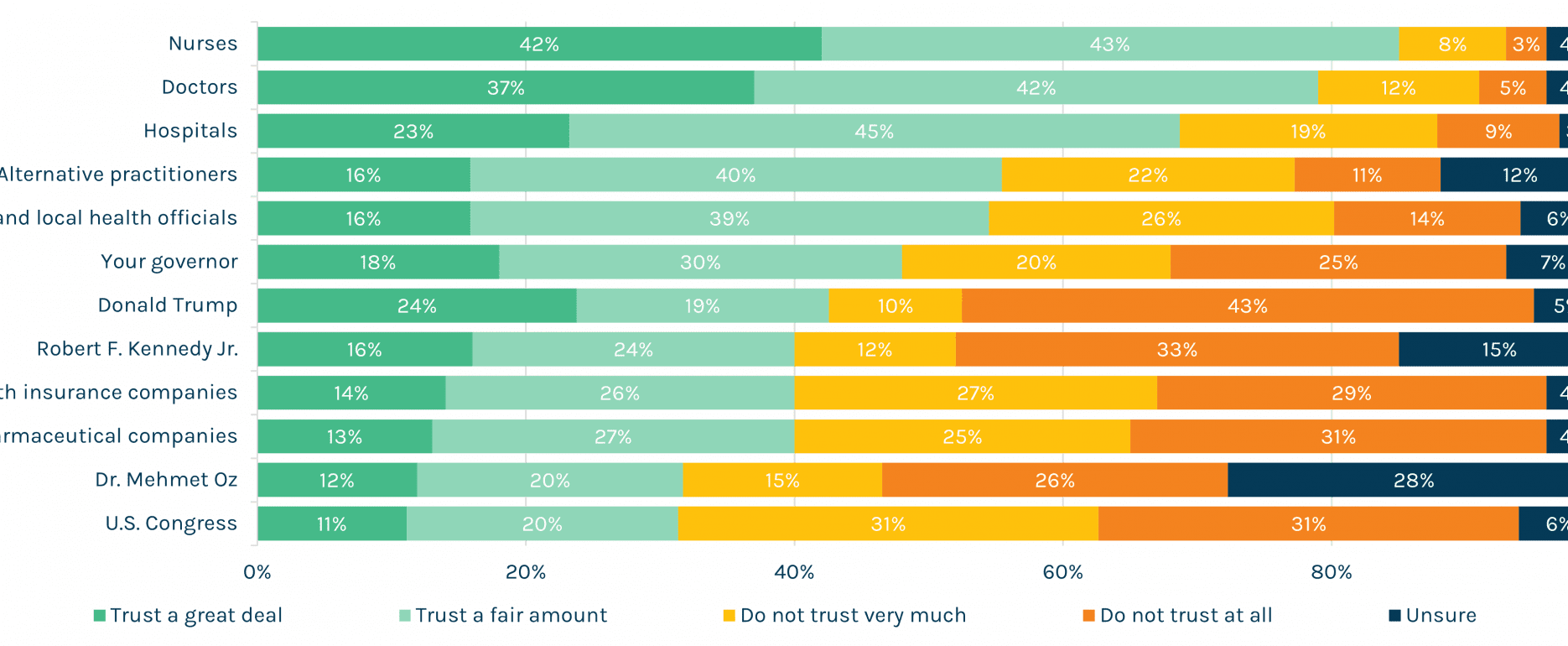The Big Story: Who’s to blame for the shutdown? All of the above, Reuters/Ipsos poll finds
“Americans blame both Republicans and Democrats for the ongoing government shutdown and are worried services could falter as a third of the federal workforce sits on unpaid leave…”
Just the facts, Ma’am
By Isaac Squyres and David Shifrin
3-minute read
We’re nearly two weeks into the federal government shutdown, with pollsters and politicos focused on getting an accurate pulse on who Americans blame. But how much does the answer to that question really matter?
In a shutdown ostensibly anchored in healthcare issues, we would argue the more relevant questions should be:
- Who’s going to solve the underlying problems (i.e., healthcare issues)
- What is the path forward?
Jarrard recently looked at the first question in our quarterly trust and policy tracking survey. That’s the one where we ask the public: “How much do you trust each of the following people or groups when it comes to developing healthcare policy, laws and solutions to improve healthcare?”

Yet again, we found that those closest to healthcare (nurses, doctors, hospitals) are significantly more trusted by the public. Who is at the bottom? The U.S. Congress. Yes, we know, you’re shocked. But the trust gap here is huge, where providers of care enjoy a more than 2:1 trust advantage.
So, while the shutdown blame game is interesting and relevant for political pundits and handicapping, it’s less useful for healthcare leaders working to determine how to move their organizations forward in today’s hyper-partisan environment. After all, providers haven’t been winning too much in the halls of D.C. or in state legislatures recently. Why?
Because it’s not all sunshine and roses for hospitals when it comes to public perception. In fact, our research – going all the way back to 2021 – shows around two-thirds of the U.S. public consistently say hospitals put profits over patients.
We maintain that these seemingly disparate findings – the elevated level of trust the public has in providers and provider organizations to improve healthcare and the public’s skepticism about those organizations’ financial motives – point to a way forward.
Our findings tell us again and again that provider organizations have the advocates they need and all the elements for framing a politically persuasive story.
Trusted messengers? Check. Message elements? Check. What’s so often missing? The “telling” part of storytelling. After all, your story won’t deliver itself. If you’re not intentionally telling your story – or, more likely, not telling it effectively – someone else will define and tell “your” story for you. And you won’t like it.
Focus on the story of your organization’s future, the impact you’re making and equip and empower your trusted voices to tell it.
While walking the political tightrope requires thoughtfulness and care, it is imperative that you articulate a clear picture of where your organization is going and why.
Put patients and communities – not the business of care – front and center. Healthcare organizations must lead conversations about healthcare in their communities rather than sit back and take the blame for healthcare’s problems and the downstream effects of disliked policies. Govern your story.
Be specific. And local.
Don’t paint in broad strokes. Provide details and, whenever possible, put them in human terms rather than financial or political ones. Emphasize community impact and a commitment to mission, not money.
Highlight the care you’re delivering to the people in your community and underscore that it’s people’s friends and neighbors who are providing that care. You know your community and its concerns. Work within that local, personal framework rather than the national debate.
No matter what, you must speak up. Nature abhors a vacuum, and there is both a need and responsibility for provider organizations to lead the conversation about care in their communities.
In a moment when everything is loud and fraught, maturely playing it straight with a relentless, proactive focus on real people who make an impact and make healthcare as good as it can be is the best way forward.
Contributors: David Jarrard, Tim Stewart, Emme Nelson Baxter
Image credit: Shannon Threadgill




